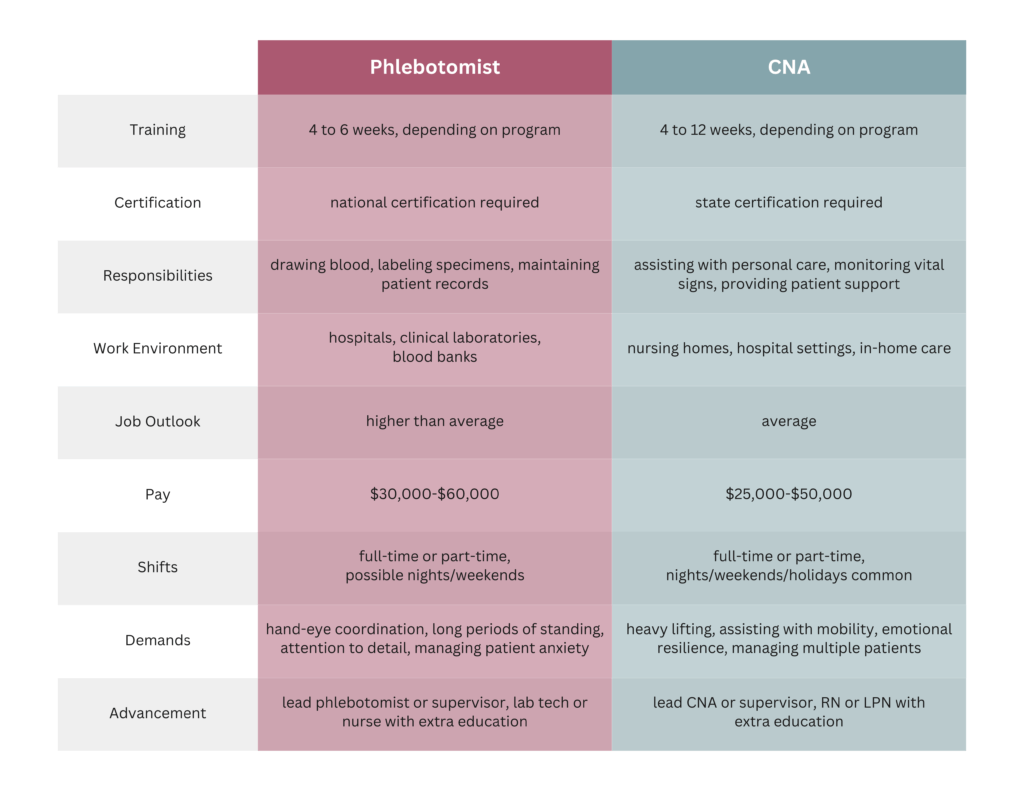05 Feb Phlebotomist or CNA? Which Job is Best?
If you are looking to begin a healthcare career, you’ve probably noticed that the entry-level certification-based options are abounding. That’s a great thing! On the other hand, the amount of options can also make things confusing. That’s a not-so-great thing. Fear not; we are here to help! Two options stand out for great career opportunities and quick training times. These are Phlebotomy and Certified Nursing Assistant (CNA). Each plays a big part in ensuring patients are well cared for and happy. In this article, we will compare and contrast these two professions, helping you find the best fit for you.
Phlebotomists and CNAs Explained
A phlebotomist is someone who is specially trained to take blood from patients for tests, research, or donations. They need to be very careful and skilled with their tools. Also, they need to be good at helping patients feel comfortable. Phlebotomists are important because they make it possible for people to discover the cause of their illnesses.
A certified nursing assistant, or CNA, helps care for patients directly. They help patients with everyday tasks such as bathing, dressing, feeding, and transporting. They are a vital support system for nurses. CNAs are very important because they watch over the patients and inform other healthcare workers if something changes with the patient’s health.
Training
Phlebotomist
To become a phlebotomist, you usually take a course that can last a few weeks to a few months. You can do this at a college or a postsecondary/trade school. If you take this course at a college, it might take up to a year. In the class, you’ll learn about the human body, how to safely take blood, and other important safety rules. Hands-on practice is a big part of a good phlebotomy training program.
CNA
CNAs need to complete a state-approved training program. This includes learning in a classroom and practicing in a real healthcare setting. Just like with phlebotomy training, you can choose to learn at a college or a special school. These programs at special schools can be finished in 4 to 12 weeks, but college courses might take longer. In these courses, you’ll learn the basics of nursing, more about the human body, and how to care for patients.
Certification
Phlebotomist
After they finish their training, phlebotomists must get a special certificate from a recognized organization. This is often included in training. They must pass a test and show they’ve practiced enough to get this certificate. Phlebotomy certificates are national. So, if you get your certificate in one state, like Idaho, you can still work in another state, like Georgia. But, some states like California, Louisiana, Nevada, and Washington want you to have a state license too, along with your national certificate.
CNA
CNAs have to do something similar. They must pass a test and show they’ve finished their training to get their certificate, which is usually part of their training program. However, CNA certificates are different in each state. That means if you move to a different state, you’ll need to get a new certificate that’s just for that state. This makes sure they can be officially listed as a CNA in that state and work there legally.
Responsibilities
Phlebotomist
- Drawing blood while keeping patients comfortable
- Correctly labeling and handling collected blood
- Updating and keeping track of patient records
- Keeping equipment and workspaces clean and safe
CNA
- Helping patients with daily living activities
- Checking and recording vital signs
- Reporting changes in patient health to nurses
- Making sure patients are comfortable and safe
Work Environment
Phlebotomist
Phlebotomists mainly work in hospitals, laboratories, blood banks, and healthcare clinics. Some people choose to work as mobile phlebotomists, going directly to people’s homes to collect blood.
CNA
CNAs mainly work in nursing homes, hospitals, and assisted living facilities. Many also choose to do in-home care, working directly from patients’ homes.
Job Outlook
Phlebotomist
Many people need blood tests to check for sicknesses, so the need for phlebotomists is getting bigger and bigger. Experts think this job will grow by 8% in the next eight years, which is faster than most other jobs. Every year, about 19,500 job spots are opening up for phlebotomists.
CNA
As more people get older and need extra help, CNAs are becoming more needed, too. This job might grow by about 4% in the next eight years, which is pretty normal compared to other jobs. There are around 209,400 job openings yearly for CNAs and similar jobs, making it a job with many chances to find work.
 Pay
Pay
Phlebotomist
How much phlebotomists get paid can change based on where they work, where they live, and how long they’ve been doing the job. Usually, the longer they work, the more money they can make. On average, a phlebotomist might make about $39,000 a year. Some who are really good at their job can make between $50,000 and $60,000.
CNA
For CNAs, how much they earn also depends on where they work and how much experience they have. More experience and extra certificates can mean more money. On average, a CNA might earn about $36,000 a year. On the other hand, CNAs who have been working for a long time and are very experienced can make between $40,000 and $50,000 a year.
Shifts
Phlebotomist
Phlebotomists might have different work hours, like in the morning, evening, or on weekends, based on when their place of work is open. They can usually choose to work part-time or full-time, depending on what they prefer.
CNA
CNAs can sometimes choose when they work, but they might have to work at night, on weekends, and during holidays. This is because places like hospitals and nursing homes need to take care of people all the time, every day. CNAs also have the choice to work either part-time or full-time.
Demands
Phlebotomist
The job of a phlebotomist can be hard on your body because you may have to stand for a long time. You also need good hand-eye coordination to carefully find veins for drawing blood. Talking to people and making them feel at ease can also be challenging. This is especially true because many people feel nervous around needles. Ensuring patients feel okay and safe is an important part of the job.
CNA
Being a CNA means you need to be physically strong. You’ll often help lift and move patients who can’t move on their own. It can also be tough on your heart because you might become very close to patients, some of whom may not have much time left. Plus, taking care of many patients at once can be very stressful.
Career Advancement
Phlebotomist
As a phlebotomist, you can move up to bigger roles, like being a lead phlebotomist or supervisor. You would help teach new people, make work schedules, and ensure everything is done safely. If you want to learn even more, you could go into other healthcare jobs like working in a lab or becoming a nurse. You would have to go back to school, but what you’ve learned as a phlebotomist would really help you get started.
CNA
CNAs have many good ways to grow in their jobs. For example, you could become a lead CNA, which means you would help organize patients and train other CNAs. If you want to do even more, you could become a licensed practical nurse (LPN) or a registered nurse (RN) next. These jobs let you do more, like give medicine and manage a team. They also let you make more decisions for the patient. To move from a CNA to an LPN or RN, you need to go to school again, but the things you learned as a CNA can really help make it easier to learn new things.
Conclusion
In conclusion, deciding to become a phlebotomist or a CNA means thinking about what you like to do, what you’re good at, and how you want to help in healthcare. Both jobs are important and can make a big difference in people’s lives. Each needs different skills and strengths. If you like taking blood samples and talking to people, being a phlebotomist might be for you. If you prefer helping people with their day-to-day needs, then being a CNA could be a better fit. Both jobs are very important in healthcare and are great choices if you want to help others.

